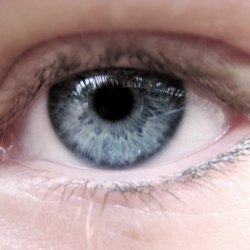
Richard Kramer of the University of California, Berkeley and his colleagues have invented a “photoswitch” chemical named DENAQ that confers light sensitivity on normally light-insensitive retinal ganglion cells, restoring light perception in blind mice.
An earlier photoswitch investigated by the researchers in 2012 called AAQ requires very bright ultraviolet light, which can be damaging; and AAQ dissipates from the eye within a day after injection. But just one injection of DENAQ into the eye confers light sensitivity for several days with ordinary white light.
As described in a study appearing in the February 19 issue of the Cell Press journal Neuron, the compound may be a potential drug candidate for treating patients suffering from degenerative retinal disorders.
Experiments on mice with functional, nonfunctional, or degenerated rods and cones showed that DENAQ only impacts retinal ganglion cells if the rods and cones have already died. It appears that degeneration in the outer retina leads to changes in the electrophysiology in the inner retina that enables DENAQ photosensitization, while the presence of intact photoreceptors prevents DENAQ action.
